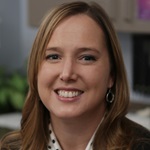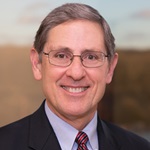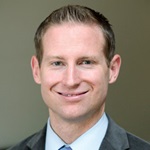Know Your Body, Trust Your Gut
 Sara Finkes wants women and men to know how important self-checks are for catching breast cancer early.
Sara Finkes wants women and men to know how important self-checks are for catching breast cancer early.
“Be comfortable with your body and be your best advocate,” says the 43-year-old nurse from Troy. “If you have questions, ask them and never wait.”
Sara, mom to a 13-year-old son and nurse educator of the operating room and cardiac catheterization lab at Upper Valley Medical Center, was surprised by her breast cancer diagnosis.
She had a clear mammogram in early October, but found a lump in her left breast later that month. She wasn’t concerned at first. She thought the lump was from her dog jumping up on her.
Reluctantly Seeking a Diagnosis
“I was reluctant to even check for it, but thought I should since I had breast pain after the dog jumped on me,” Sara says. “Maybe my dog knew it was there, or it was divine intervention.”
Sara called her nurse practitioner, Sara Marietta, CNP, who recommended a mammogram and breast ultrasound. When those results indicated a high likelihood of cancer, a biopsy followed in January.
The diagnosis? Cancer. Since then, “it’s been a whirlwind of a year,” Sara says.
Genetic Testing Helps Build a Treatment Plan
Marietta referred Sara to Thomas Heck, MD. Sara had stage 2 invasive ductal carcinoma that is HER2 positive. This means her cancer cells carry receptors for HER2, a growth protein on the outside of all breast cells.
“They told me immediately I would need chemotherapy, and it really upset me,” Sara says. “It was the last thing I wanted to do.”
Dr. Heck explained that the make-up of Sara’s cancer cells and the results of her genetic testing made her a good candidate to get chemotherapy before surgery.
Sara tested negative for the BRCA gene mutation that can increase cancer risk, but she does have a mutation in the ATM gene. Dr. Heck says while doctors don’t fully understand the ATM gene, they know that changes in its expression can increase breast cancer risk.
“We offer genetic testing to all patients because, in some cases, it could change their treatment and reveal a risk of other cancers,” Dr. Heck says.
Based on her genetic testing results, Sara decided to have both of her breasts removed (a bilateral mastectomy) and reconstruction. “I didn’t want to think about breast cancer all the time down the road. I have a lot of life ahead of me,” she says. “And I needed to be sure I could be here for my son.”
Dr. Heck says Sara’s knowledge of medicine and cancer “helped her to really understand our train of thought when we came up with her treatment plan.”
Silver Linings
Sara’s chemo treatments were a blessing in disguise. She continued to work while getting her treatments. COVID-19 restrictions meant she could not bring support people with her to the infusion center.
“I liked being alone,” she says. “It was a chance for me to zone out and be around people like me, who were going through the same thing.”
Sara’s tumor responded well to the chemotherapy. At the end of her pre-surgery rounds, she and Dr. Heck could no longer feel the lump.
Surgery to remove Sara’s breasts and begin reconstruction followed on July 7 at Miami Valley Hospital North. Dr. Heck performed the mastectomies, and then plastic surgeon Jason Hedrick, MD, began the first of several procedures to rebuild Sara’s breasts.
“We found no residual cancer and no involvement in the lymph nodes,” Dr. Heck says. “That’s really good for her.” Sara will finish getting two types of chemotherapy for the rest of the year, but won’t need radiation, Dr. Heck says.
The breast reconstruction is going well. Sara expects to be finished with surgeries this fall. “It’s the best outcome we could have hoped for,” Sara says. “And I get new boobs for my birthday.”
Positive Attitude, Lots of Support
Of all the care and support she received, Sara says, “I am so humbled and so grateful.” Oncology nurse navigator Laura Reed, BSN, RN, CBCN, answered Sara’s questions about all aspects of her care, from scheduling to health insurance. <
Family played a big role, too. Sara’s parents pitched in whenever they could. Her mom handled her laundry. Her dad took out the trash. Both of her parents, her coworkers, and family helped with grocery shopping and by providing meals.
“People I work with gave me gift cards for groceries and little things to help me get through chemo, like lip balm and neck pillows,” Sara says. Coworkers donated their vacation days and switched schedules so that she could take time off after treatments and surgery.
She thanks “her chemo friend” for pushing her to remain positive. Sara says she was feeling down at her third chemo treatment when in walked a bubbly patient. “We said hello, and she told me how much she loves her chemo. I thought she was nuts,” Sara says. “But she says she loves it because it saved her life.”
‘God Puts Us Where He Wants Us’
Sara says her energy is returning and her chemo side effects are starting to go away.
“I feel really good,” she says. “It was wonderful – and still is – to be at work, to be seen, and to be out of my house and know that I am still just as capable.” Sara is cleared by her doctors to return to most activities and recently went kayaking.
She believes that “God puts us where he wants us.”
“I really feel that holds true for me and my entire cancer journey, including my medical team, my chemo friend, and the cancer patients I cared for while undergoing my treatments.”
Getting your mammogram is your first important step for breast health and to fight breast cancer. Schedule your mammogram online or call (855) 887-7364(855) 887-7364 Monday through Friday, 7:30 a.m. to 6 p.m.
Contact Us
Call the Premier Health cancer hotline at (844) 316-HOPE(844) 316-4673 (4673), Monday through Friday, 8 a.m. to 5 p.m., for more information.




